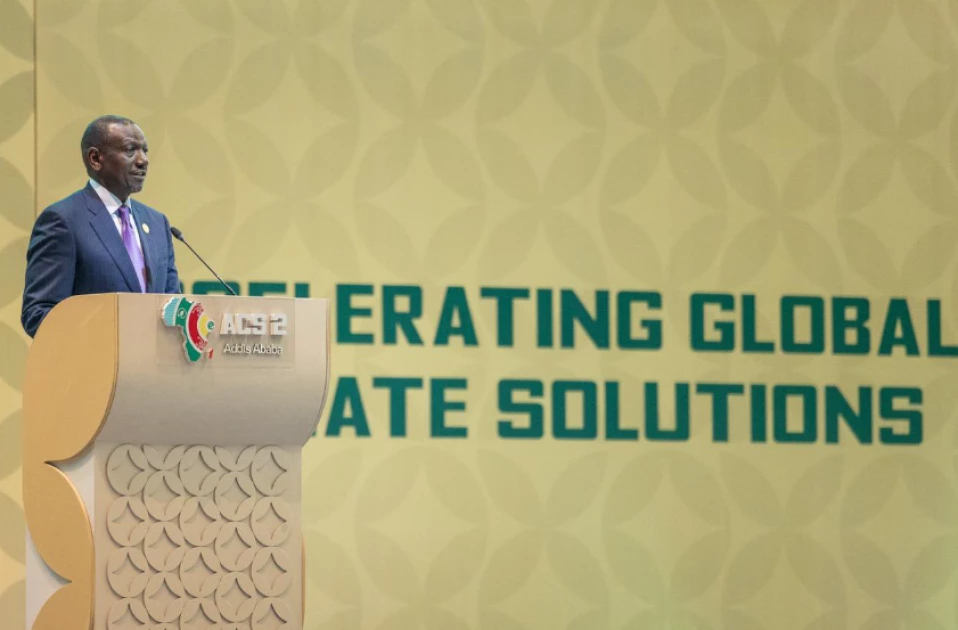Kenya to sign power deal with Ethiopia after Africa's largest dam launched

President William Ruto addresses the 2nd Africa Climate Summit in Addis Ababa, Ethiopia, on September 8, 2025. PHOTO | PCS

Audio By Vocalize
Kenya is ready to sign a power purchase agreement with
Ethiopia to uptake reserve power from the 6,450 megawatts Grand Ethiopian
Renaissance Dam (GERD), President William Ruto has said.
The President noted that with Kenya’s peak demand exceeding
2,300MW and continuing to rise, this additional capacity would strengthen the
country’s reserve margin and reduce supply deficits.
He pointed out that, beyond affordability, the clean and
stable supply would enhance grid reliability, particularly during droughts when
hydropower output is volatile.
“Reliability is especially critical for special economic zones,
industrial parks, ICT hubs, and agro-processing facilities, all of which
require consistent and affordable power to drive Kenya’s development agenda,”
he said.
President Ruto made the remarks during the inauguration of the
Grand Ethiopian Renaissance Dam in the Benshangul Gumuz region, Ethiopia
alongside Prime Minister Abiy Ahmed and other regional leaders.
Others present included Presidents Ismaïl Omar Guelleh
(Djibouti), Hassan Sheikh Mohamud (Somalia), Salva Kiir Mayardit (South Sudan),
and Barbados Prime Minister Mia Mottley.
President Ruto commended Ethiopia for the $5 billion mega
project, finances that were mobilised domestically and without debt.
He drew a parallel with Kenya’s pursuit of raising local
resources to finance affordable housing projects aimed at eradicating slums.
He said the Grand Ethiopia Renaissance Dam, the largest in
Africa, stands as a monumental symbol of the continent’s capacity to chart its
own destiny and deliver transformative infrastructure.
Additionally, the President said, the project offers a
blueprint for scaling up similar initiatives across Africa and bridging the
continent’s energy divide.
At a time when energy demand is surging due to rapid
population growth, urbanisation, and the push for green industrialisation,
President Ruto explained that the dam represents not only Ethiopia’s vision,
but also Africa’s collective stride towards sustainable progress.
“The Grand Ethiopian Renaissance Dam is not only a feat of
engineering ambition, but also a bold affirmation of Africa’s capacity to shape
its own destiny, marshal its resources, and deliver transformative
infrastructure in pursuit of prosperity,” he said.
Over the waters of the River Nile, the President acknowledged
the concerns of the Nile Basin States and supports ongoing trilateral
negotiations between Ethiopia, Egypt, and Sudan.
“These negotiations provide the most viable path to a mutually
acceptable agreement, one that respects sovereign rights and developmental
aspirations while ensuring equitable use of the Nile waters,” he said.
He commended the progress made so far and urged continued
dialogue rooted in compromise, good faith, and adherence to international
norms.
“Kenya stands ready to provide facilitative or technical
support to help bridge gaps and foster lasting consensus,” he pointed out.
On his part, President Salva Kiir commended Ethiopia for the
transformative project, noting that the success of one nation is the success of
all nations.
He announced that South Sudan would sign a power agreement to
receive electricity supply from the dam.
“This will bring power to our towns, villages, schools, and
hospitals, creating new opportunities for our people,” he said.
President Mohamud of Somalia called for regional cooperation
that promotes shared prosperity and peaceful co-existence.
He affirmed that all nations along the Nile have a right to
use the waters fairly.
Prime Minister Mottley of Barbados noted that despite being
denied funding by development partners, Ethiopia had demonstrated resilience in
building the dam.


Leave a Comment